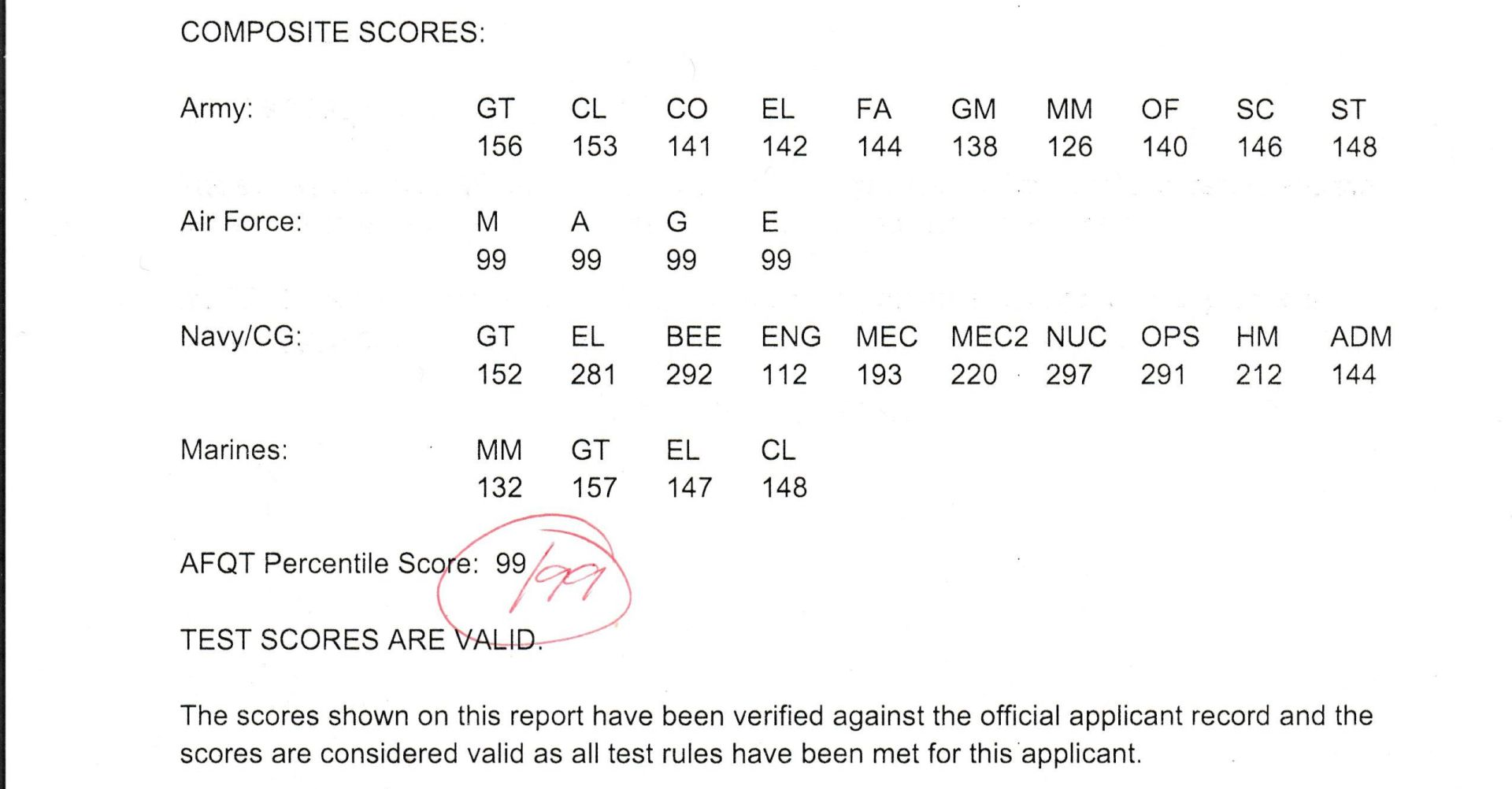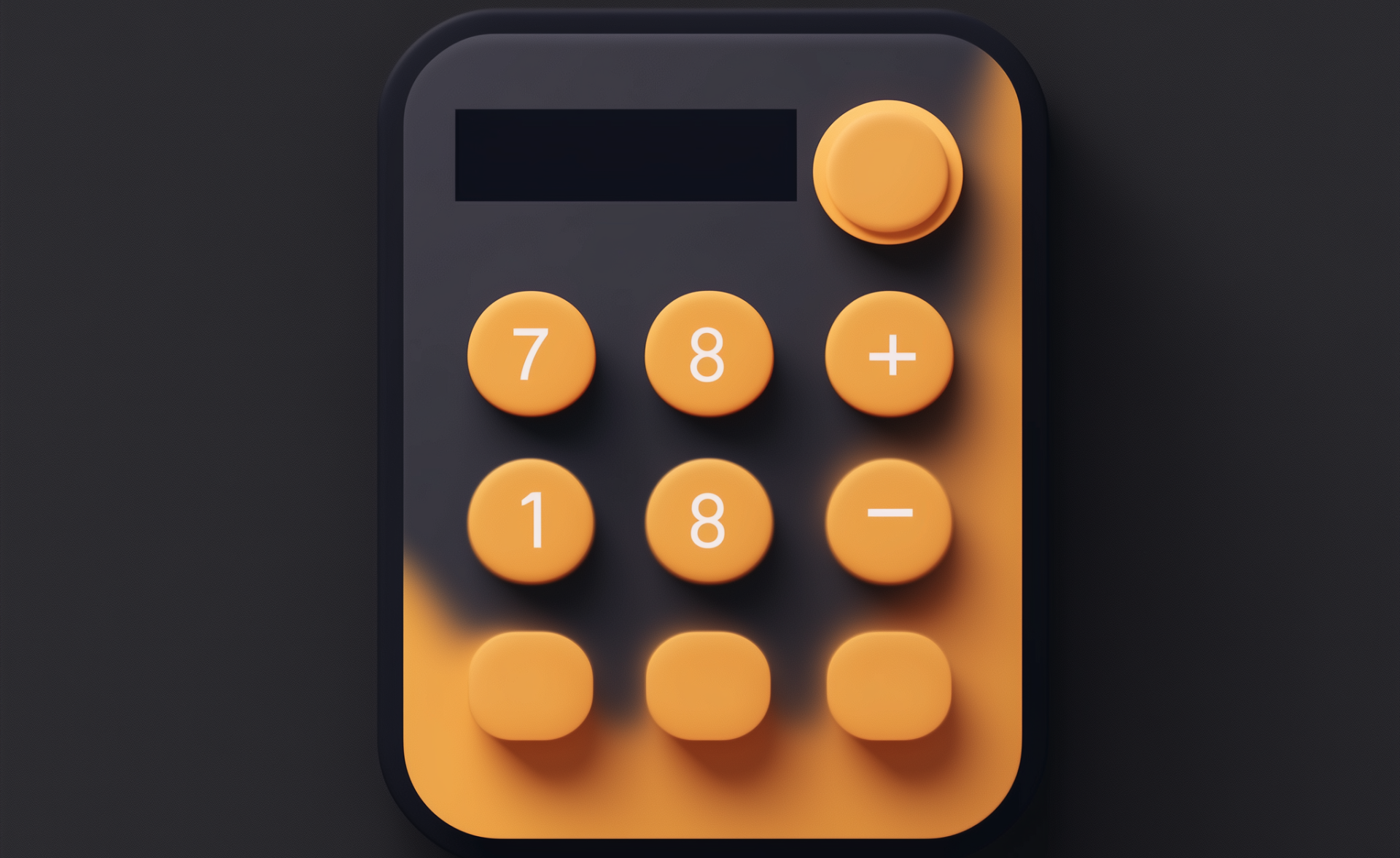ASVAB scores explained: Your complete guide to military test scores, calculations, and requirements
Oct 25
/
Anderson Duran

What is a Good ASVAB Score? Complete Guide to Score Ranges
What's going on everybody, it's Coach Anderson, and today we're diving deep into ASVAB score ranges and what makes a 'good' score. I got you on this - it's all about understanding how your performance stacks up. The ASVAB uses a percentile scoring system from 1-99, meaning your score shows how you performed compared to other test-takers. Think about it like this: if you get a 60, you've outperformed 60% of other test-takers.

Let me break down the key ranges for you:
• Scores below 30-31 are considered very low and typically won't qualify for military service
• 50 is the average score
• Mid-70s are considered above average
• Scores of 90+ qualify you for the most technically demanding roles

Minimum scores by branch:
• Army: 31+
• Navy: 35+
• Air Force: 36+
• Marines: 32+
• Coast Guard: 40+
But here's the thing - these are just minimums. Your needed score really depends on your desired military occupation. For instance, if you're aiming to become a Cryptologic Technician in the Navy, you'll typically need a score of 90 or higher, while administrative roles might only need scores in the 50s.
Free ASVAB classes on Mondays 6pm-8pm eastern time. Includes a free ASVAB AFQT practice test with video solutions to each section, automatically timed. Click the button below to save your spot!
Free ASVAB classes on Mondays 6pm-8pm eastern time. Includes a free ASVAB AFQT practice test with video solutions to each section, automatically timed. Click the button below to save your spot!
How Long Are ASVAB Scores Good For? Validity and Retesting Guide
Now, let's move on to something super important - how long your ASVAB scores stay valid. Don't worry, I'll make this crystal clear for you. Think about it like this: most of you will have 2 years from your test date before your scores expire.

Here's how it breaks down by category:
• Non-prior service applicants get 2 years
• Active service members keep their scores throughout active service
• Prior service members' validity varies by branch
Let me show you what I mean about retesting: You'll need to wait one month after your initial test to retest, mandatory retesting happens after that 2-year mark expires, and some branches have their own specific waiting periods. For special cases: Active duty folks keep their scores while serving, branches might have different policies about accepting other branches' scores, and some specialized positions might need fresher scores. Keep practicing this and you'll see improvement in your scores if you need to retest!
How to Calculate ASVAB Score: Understanding the Scoring System

This brings us to the nuts and bolts of ASVAB scoring. I got you on this - while it might seem complicated, we'll break it down step by step. Here's a perfect example of how it works: You've got your standard scores (0-100 for each subtest), your AFQT percentile score, and composite scores for specific jobs.
The test covers nine key areas:
• General Science (GS)
• Arithmetic Reasoning (AR)
• Word Knowledge (WK)
• Paragraph Comprehension (PC)
• Mathematics Knowledge (MK)
• Electronics Information (EI)
• Auto and Shop Information (AS)
• Mechanical Comprehension (MC)
• Assembling Objects (AO)
Think about it like this: composite scores combine different subtests relevant to specific military careers. Technical composites might mix MK, GS, and EI scores, while administrative ones focus more on WK and PC. Remember, 50 is average on any subtest, and scores below that in key areas might limit your options. Let's keep building on this to get you where you want to be!
AFQT vs ASVAB: Key Differences Explained
Let's dive into something that confuses a lot of people - the difference between AFQT and ASVAB. Here's the thing - they're related but serve different purposes. Think about it like this: ASVAB is the whole enchilada with 9 subtests, while AFQT is just a score calculated from four specific ASVAB sections. The ASVAB evaluates your overall aptitude and helps with job placement, while the AFQT (using Word Knowledge, Paragraph Comprehension, Arithmetic Reasoning, and Mathematics Knowledge) determines if you can join at all. Here's a perfect example: You might ace the mechanical parts of the ASVAB, but if your AFQT score doesn't meet the minimum, you won't qualify regardless of those strong areas. Keep practicing this and you'll master both aspects!
What is a Good AFQT Score? Military Branch Requirements
Next up, we need to talk about what makes a good AFQT score. I got you on this - it's all about understanding where you stand in that 1-99 percentile range.
Minimum requirements by branch:
• Air Force: 36
• Army: 31
• Navy: 35
• Marines: 32
• Coast Guard: 40
Here's how the categories break down:
Here's how the categories break down:
• Category I (93-99) is exceptional
• Category II (65-92) is above average
• Category IIIA (50-64) and IIIB (31-49) are average
• Category IV (10-30) is below average
• Category V (1-9) is significantly below average
Think about it like this: scoring 50+ makes you competitive, 70+ opens most doors, and 90+ might get you special programs and bonuses. Remember, this is all about getting you closer to your goals!
Military Career Qualification: Using Your ASVAB and AFQT Scores
Here's another crucial part: using your scores to map out your military career path. Don't worry - we'll break this down into manageable pieces. Here's a perfect example of how to approach this: First, check your AFQT against branch minimums, then look at composite scores for your desired career field, consider both standard scores and percentiles, and review line scores for specific jobs.
The process goes like this:
• Start with AFQT qualification
• Check specific job score requirements
• Review additional qualifications
• Look at bonus qualification scores

Different careers need different scores:
• Technical roles usually want 70+ in relevant composites
• Medical positions need 60+ with strong science scores
• Administrative roles look for 50+ with strong verbal scores
• Combat positions vary by branch and role
Want to take your ASVAB prep to the next level? Our full ASVAB program gives you access to live classes, 500+ recorded classes, self-paced AFQT courses with progress tracking, dozens of practice tests, study guides, and personal support by text and email. Click the button below to learn more! Let's keep building on this to help you reach your military career goals!
Latest from our blog
The 5 Steps to Effective Learning
It's about quality, not quantity. Watch this video to learn how to learn fast AND confidently!
Write your awesome label here.
What's the Best Way to Focus?
It's not easy balancing studying for the ASVAB with all of your other commitments. Start here to make focusing and raising your score easy!
Write your awesome label here.
3 Simple Steps to Dominate Word Problems
There are 3 key steps to solving word problems!
- Identify the Question
- Use Keywords to Make a Plan
- Solve
Watch below to see how it works!
Write your awesome label here.
ASVAB Basics: The ASVAB, AFQT, PiCAT, and MEPS Explained
Learn the basics to the ASVAB and the related terms that you should know as an applicant.
Write your awesome label here.
Don't Fall for the Practice Test Trap
Redoing the same practice test over and over won't raise your score. Watch and learn how to use practice tests the RIGHT way.
Write your awesome label here.
Write your awesome label here.
Write your awesome label here.
Write your awesome label here.
Write your awesome label here.
Write your awesome label here.
Write your awesome label here.
Write your awesome label here.
Write your awesome label here.
Write your awesome label here.



